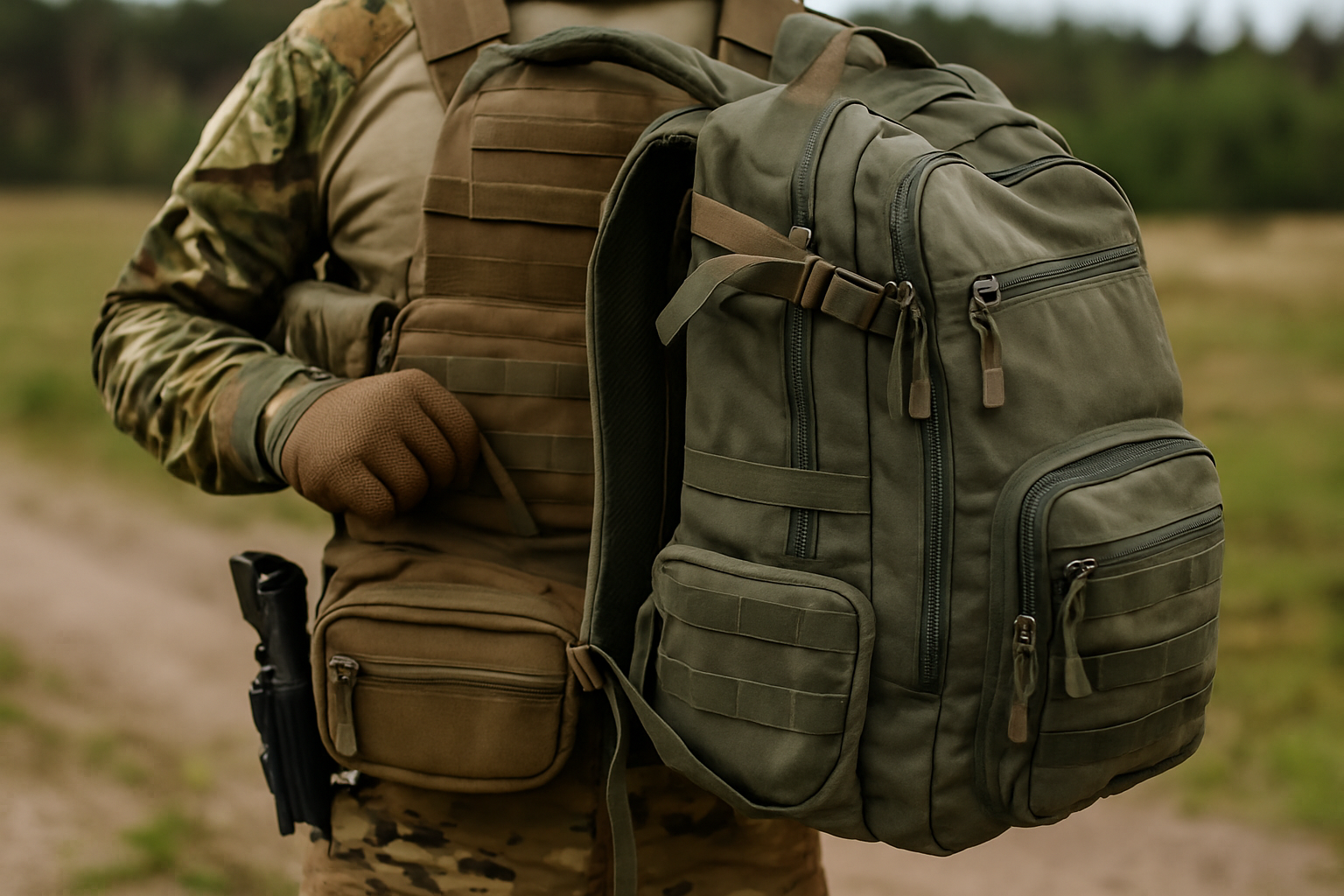Why Zippers Matter in Emergency Responder Gear Bags
Emergency responder gear bags are lifelines. Whether used by firefighters, EMTs, police officers, military personnel, or industrial response teams, these bags carry mission-critical equipment needed in life-or-death scenarios. Yet, despite rugged fabrics and reinforced stitching, the most common failure point in emergency responder bags is the zipper.
A weak or poorly designed zipper can jam, break, or corrode, leaving critical medical tools, protective equipment, or tactical gear inaccessible. In contrast, heavy-duty zippers for gear bags—engineered for strength, abrasion resistance, water-resistant performance, and load-bearing capacity—transform bags into reliable companions in extreme conditions. For OEMs and fabricators, choosing the right zipper is not a small decision; it directly impacts durability, compliance, and responder safety.
Why Heavy-Duty Zippers Are Essential in Emergency Bags
In emergency environments, gear bag zippers are exposed to punishing stress. A firefighter dragging a turnout gear bag through smoke and debris, an EMT reaching for life-saving medical tools in the rain, or a soldier carrying a tactical pack in desert heat—all depend on zippers that won’t fail.
Heavy-duty zippers for emergency responder bags provide:
- Load-bearing strength: Oversized medical and tactical gear bags require zippers in gauges #8, #10, or #12 to withstand bulky equipment and repeated tension.
- Abrasion resistance: Abrasion-resistant zippers prevent splitting and wear when bags are dragged, scraped, or exposed to rough surfaces.
- Environmental resilience: Water-resistant zippers for emergency gear block rain, marine spray, and chemicals, while corrosion-resistant zippers extend life in coastal or humid regions.
- Chemical and fire resistance: Firefighter gear bag zippers with flame-retardant tapes and specialized coatings maintain closure integrity in extreme heat and hazardous environments.
In short, heavy-duty zippers are not simple fasteners. They are structural components that determine whether emergency gear remains accessible and secure when lives are on the line.
Applications Across Emergency Responder Sectors
Firefighter Gear Bags
Firefighter gear bags carry turnout gear, gloves, helmets, and SCBA equipment. These bags demand fire-resistant, abrasion-proof zippers engineered to survive high heat, chemical decontamination, and constant rough handling. Oversized, load-bearing zippers prevent teeth from splitting under the weight of bulky PPE. Pullers designed for gloved hands allow firefighters to access their equipment instantly during emergencies.
Police and Military Packs
Tactical gear zippers used in military and law enforcement packs must meet MIL-SPEC standards for durability, stealth, and corrosion resistance. Police bags and military deployment packs often require low-reflective, quiet-running zippers to avoid detection in tactical operations. Corrosion-resistant finishes protect hardware in coastal or desert environments, while reinforced sliders ensure reliability under combat loads.
EMT Medical Response Bags
Medical response bags with durable zippers must open smoothly, without jams, to allow rapid access to life-saving supplies. Water-resistant and abrasion-resistant zippers keep sterile medical tools, electronics, and pharmaceuticals safe from contamination. High-security zippers are often integrated to restrict access to narcotics and controlled medical supplies, ensuring compliance as well as functionality.
Industrial Responder Bags
Disaster recovery teams, utility workers, and industrial responders rely on rugged gear bags exposed to dust, grease, solvents, and abrasive surfaces. Industrial responder bags with abrasion-resistant, water-resistant zippers prevent premature failures, keeping tools and PPE secure. Heavy-duty sliders and oversized zipper chains provide strength in oversized tool bags subjected to daily abuse.

Engineering Features That Define Heavy-Duty Zippers
The difference between standard zippers and high-performance emergency responder zippers comes down to engineering.
Zipper gauge strength determines how much load the zipper can withstand. For oversized tactical packs or medical gear bags, #10 and #12 zippers provide superior load-bearing performance. Reinforced sliders reduce breakage under tension, while autolock sliders prevent accidental opening during operations.
Waterproof zipper tape seals out rain, saltwater spray, and chemical spills, protecting sensitive gear in coastal or industrial environments. Corrosion-resistant finishes prevent degradation from salt, humidity, and sweat, while UV-resistant coatings preserve integrity under long-term sun exposure.
Finally, custom zipper pull designs give operators wearing gloves or chemical suits the ability to access contents instantly. Every engineering feature—gauge, coating, slider, tape, and finish—works together to transform the zipper from a weak point into a mission-ready closure system.
OEM Considerations and Supply Chain Reliability
For OEMs and gear manufacturers, sourcing zippers is not just about performance—it’s about reliability and compliance. Custom zippers for emergency gear bags can be engineered to meet exact OEM requirements for gauge size, finish, slider type, and tape material.
Working with a U.S.-owned zipper manufacturer like LenZip ensures:
- On-spec delivery: Zippers engineered for military, medical, and industrial standards.
- Supply chain reliability: Domestic manufacturing avoids delays tied to global shipping.
- Compliance assurance: NFPA, OSHA, MIL-SPEC, and CE standards supported.
- Custom engineering: OEMs can collaborate on specialized solutions, from load-bearing tactical zippers to water-resistant medical bag closures.
For fabricators and OEMs, a zipper partnership with a U.S.-based supplier eliminates the risk of failure, ensures compliance, and protects brand reputation in life-critical markets.

Why Zipper Reliability Equals Responder Safety
Emergency responders can’t afford zipper failure. A jammed zipper on a firefighter gear bag could delay deployment. A broken tactical zipper in a military pack could compromise mission readiness. A failed medical bag zipper could delay access to life-saving treatment.
That is why heavy-duty zippers for emergency responder bags must combine strength, abrasion resistance, water resistance, corrosion resistance, and long-term reliability. For OEMs, specifying the right zipper isn’t just a design choice—it is a safety-critical decision.
Conclusion: Heavy-Duty Zippers as Life-Saving Closures
Emergency responder bags are only as reliable as their closures. When it comes to firefighter gear bags, tactical police packs, EMT medical response bags, and industrial tool bags, heavy-duty zippers are essential for safety, performance, and compliance.
Partnering with a U.S.-owned zipper manufacturer like LenZip ensures gear bags are equipped with closures that resist corrosion, withstand extreme loads, and operate smoothly under pressure. For OEMs and gear designers, investing in abrasion-resistant, water-resistant, and custom-engineered zippers guarantees responder readiness—when every second matters.
Explore zipper durability and design in more detail in The Ultimate Heavy-Duty Zipper Guide.
FAQ
Q1. What type of zippers are best for firefighter gear bags?
Firefighter gear bags require fire-resistant, abrasion-resistant, heavy-duty zippers (gauge #10 or larger) capable of withstanding high heat and bulky PPE loads.
Q2. Are water-resistant zippers necessary for emergency responder bags?
Yes. Water-resistant zippers for emergency gear protect medical supplies, uniforms, and electronics from rain, chemical spills, and marine exposure.
Q3. Why do zippers fail in tactical and military gear bags?
Standard zippers fail under heavy loads, abrasion, or sand exposure. Tactical gear zippers are reinforced with stronger chains, corrosion-resistant coatings, and heavy-duty sliders built for combat conditions.
Q4. Can OEMs customize zippers for emergency responder gear?
Yes. OEMs can specify custom zippers for responder bags, including gauge size, slider type, waterproof tape, and puller design for gloved operation.
Q5. What gauge zipper is best for oversized responder bags?
Oversized gear bags benefit from #10 or #12 heavy-duty zippers, which resist splitting and provide load-bearing strength under extreme weight.
Q6. Why choose a U.S.-owned zipper manufacturer for emergency gear bags?
A U.S.-owned zipper supplier like LenZip offers compliance, faster delivery, reliable supply chain performance, and engineering expertise for mission-critical gear.
